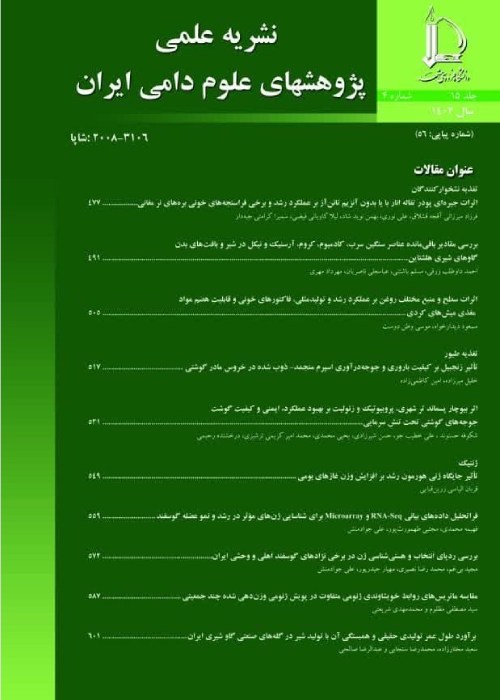Effect of Essential Oils of Peppermint, Lemon, Thyme and Ajwain on Performance, Blood Metabolites and Hepatic lipogenic Gene Expression of Broilers
Author(s):
Abstract:
Intoduction Essential oils (EOs) are important aromatic components of herbs and spices which are complex mixtures of secondary plant metabolites consisting of low-boiling-phenylpropenes and terpenes. Their biological activities have been known and utilized since ancient times in perfumery, food preservation, flavoring, and medicine. Some of their biological activities include antibacterial, antifungal, anti-oxidant and anti-inflammatory effects. The ban on the use of antibiotics as growth promoters has stimulated the search for alternative feed supplements in animal production. EOs have received attention in recent years as potential natural alternatives for replacing antibiotic growth promoters (AGPs) in animal diets due to their positive impact on growth performance and welfare. A number of studies have been carried out to investigate the effects of EOs on broiler performance rather than the physiological effects, but the results have not been consistent (or constant). The purpose of this study was to investigate the effects of four essential oils (Thymus vulgaris, Mentha piperita, Citrus lemon, Carum copticom) on growth performance, some of the serum biochemistry parameters and lipogenic gene expression in broiler chickens.
Materials and Methods A total of 312, 1-day-old broiler chicks were allocated in completely randomized design to 13 groups with 6 replicate cages per treatment. After 2-day adjustment with the basal diet, the birds were randomly assigned to the corresponding experimental diets supplemented with 0 (Control), 50, 100 and 150 mg/kg diet essential oils extracted from Crum capticum, Thymus vulgaris, Mentha piperita and Cirtus lemon. The basal diet composed of maizesoybean meal prepared in our laboratory and all birds had free access to water for the entire period. Food intake and BW were recorded to determine growth performance and feed: gain ratio. At the end of the experiment (42 day) blood samples (6 samples per treatment) were taken for measuring biochemical analysis including total protein, triglyceride, total cholesterol, HDL-c and LDL-c by commercial kits. Samples of the liver were collected on day 42 after slaughter (6 samples per treatment) and the hepatic expression of the genes encoding malic enzyme (ME), fatty acid synthase (FAS) were determined with reverse transcription-polymerase chain reaction (RT-PCR) using SYBR green as a flourophore monitored in a real time mode.
Results and discussion The results showed that the body weight, feed intake and feed conversion ratio of broilers at day 42 were not affected by supplementing EOs to the basal diet. However, daily body weight gain of broilers at 21 day decreased significantly (P
Materials and Methods A total of 312, 1-day-old broiler chicks were allocated in completely randomized design to 13 groups with 6 replicate cages per treatment. After 2-day adjustment with the basal diet, the birds were randomly assigned to the corresponding experimental diets supplemented with 0 (Control), 50, 100 and 150 mg/kg diet essential oils extracted from Crum capticum, Thymus vulgaris, Mentha piperita and Cirtus lemon. The basal diet composed of maizesoybean meal prepared in our laboratory and all birds had free access to water for the entire period. Food intake and BW were recorded to determine growth performance and feed: gain ratio. At the end of the experiment (42 day) blood samples (6 samples per treatment) were taken for measuring biochemical analysis including total protein, triglyceride, total cholesterol, HDL-c and LDL-c by commercial kits. Samples of the liver were collected on day 42 after slaughter (6 samples per treatment) and the hepatic expression of the genes encoding malic enzyme (ME), fatty acid synthase (FAS) were determined with reverse transcription-polymerase chain reaction (RT-PCR) using SYBR green as a flourophore monitored in a real time mode.
Results and discussion The results showed that the body weight, feed intake and feed conversion ratio of broilers at day 42 were not affected by supplementing EOs to the basal diet. However, daily body weight gain of broilers at 21 day decreased significantly (P
Keywords:
Language:
Persian
Published:
Iranian Journal of Animal Science Reaserch, Volume:7 Issue: 3, 2015
Pages:
329 to 339
magiran.com/p1518125
دانلود و مطالعه متن این مقاله با یکی از روشهای زیر امکان پذیر است:
اشتراک شخصی
با عضویت و پرداخت آنلاین حق اشتراک یکساله به مبلغ 1,390,000ريال میتوانید 70 عنوان مطلب دانلود کنید!
اشتراک سازمانی
به کتابخانه دانشگاه یا محل کار خود پیشنهاد کنید تا اشتراک سازمانی این پایگاه را برای دسترسی نامحدود همه کاربران به متن مطالب تهیه نمایند!
توجه!
- حق عضویت دریافتی صرف حمایت از نشریات عضو و نگهداری، تکمیل و توسعه مگیران میشود.
- پرداخت حق اشتراک و دانلود مقالات اجازه بازنشر آن در سایر رسانههای چاپی و دیجیتال را به کاربر نمیدهد.
دسترسی سراسری کاربران دانشگاه پیام نور!
اعضای هیئت علمی و دانشجویان دانشگاه پیام نور در سراسر کشور، در صورت ثبت نام با ایمیل دانشگاهی، تا پایان فروردین ماه 1403 به مقالات سایت دسترسی خواهند داشت!
In order to view content subscription is required
Personal subscription
Subscribe magiran.com for 70 € euros via PayPal and download 70 articles during a year.
Organization subscription
Please contact us to subscribe your university or library for unlimited access!




